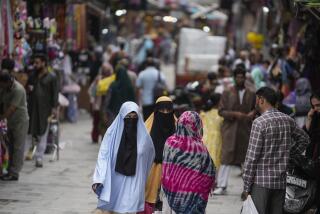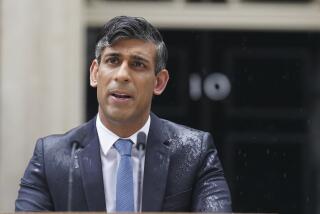Myanmar announces November election
Reporting from New Delhi — Myanmar announced Friday that it will hold its first election in two decades on Nov. 7, part of what analysts characterize as a bid by the secretive ruling military regime to appear more open and responsive to the outside world.
The United States and European Union have dismissed the exercise as little more than window dressing that will have little impact on who controls the country.
The announcement, however, made in the form of a brief release on state television, ends months of speculation on the timing. “The guessing game is over,” said Aung Naing Oo, a political analyst based in Thailand. “It clears the air.”
Analysts surmise that this date was chosen because Nobel prize laureate and top opposition figure Aung San Suu Kyi is scheduled for release from house arrest Nov. 22 and the regime has an interest in holding the election before she can more actively influence the results. She has spent 15 of the past 21 years in detention.
The regime has spent years ensuring that it has the best cards in the run-up. Constitutional amendments enacted in 2008, election rules announced this year and even Suu Kyi’s arrest, analysts say, were all carefully designed to blunt political opposition and avoid a repeat of its drubbing in 1990.
That year, the military called an election that it was confident of winning, only to see Suu Kyi’s National League for Democracy secure 392 of the 492 seats, at which point the generals refused to recognize the results.
This time, the National League has refused to register with the authorities in protest of what it has termed “unjust” election laws and, under those same laws, was disbanded in May. Some 40 parties have registered, of which at least seven are believed to be proxies of the military.
By law, 25 percent of seats are reserved for the military no matter who is elected, and most analysts expect the junta will have little trouble securing another 25 to 35 percent through its allies, proxies and business cronies allowing it to maintain control.
Beyond that, many of the rules ensure that key positions remain in government hands. “So even if a majority of civilians were elected, they would still have no power,” said Htun Htun, coordinator of information at India’s Burma Center Delhi, an advocacy group.
Political parties are required to submit their list of candidates between Aug. 16 and Aug. 30. This is not expected to be a particularly animated contest. Tight rules on campaigning bar parties from marching, chanting or saying anything at rallies that could “tarnish the nation’s image.”
More to Read
Sign up for Essential California
The most important California stories and recommendations in your inbox every morning.
You may occasionally receive promotional content from the Los Angeles Times.










